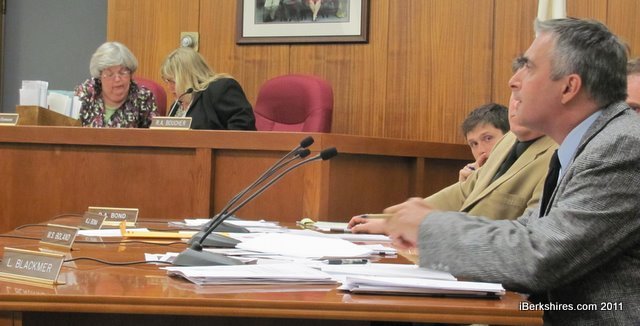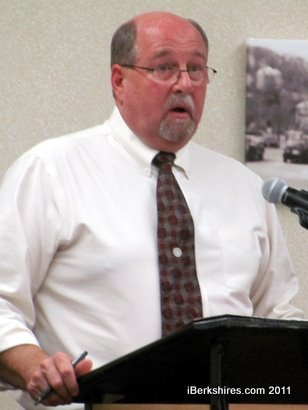| Home | About | Archives | RSS Feed |

Councilors Unhappy With Union Pay Raise
|
City Council President Ronald Boucher left the dias to question the mayor on the DPW contract. |
NORTH ADAMS, Mass. — Mayor Richard Alcombright took flack on Tuesday night for giving the Department of Public Works union a 1 percent raise while preparing for a Proposition 2 1/2 override.
Alcombright said the DPW was one of several of the city's seven public unions that had reached agreements on three-year contracts; negotiations were halted on the rest.
The City Council was asked to approve a compensation schedule retroactive to the beginning of fiscal 2011 to reflect the agreement. The cost, said the mayor, was around $9,000 this fiscal year, from reserve, and had been built into next year's budget.
Councilor Marie Harpin objected to the raises, which will be 1 percent next year and 2 percent the year after.
I'm very concerned about this mayor," said Harpin. "We're in a very financial bind in the city."
The mayor said settling the contracts now will ensure the city knows how much it will spend on wages over the next two years and allow it to budget accordingly.
"I think we've come to a fair settlement and a fair arrangement," said the mayor. "We don't want to be where we were last year settling two years of contracts ... I've had a year and half of surprises and I'm done with surprises."
He said the teachers had also agreed to a contract, which would be explained by the superintendent at the school budget review. The money would come this year and next from federal stimulus funds designated for job retention.
"The political argument is don't give anybody a raise," said the mayor, but he continued that the practical side is that wages are now fixed costs and the city avoids a possible lengthy and expensive arbitration that might have cost it the same or more in wages in the end.
"We really negotiated hard and well with these unions and I think we're in a good place."
|
Mayor Richard Alcombright explained his reasoning on union contracts. |
Councilor Lisa Blackmer said she knew that city employees worked hard but state workers had had wages frozen and been forced to take furloughs.
"I have a hard time voting for this when I have to I [and] think we would have a much easier time selling an override if we didn't give a raise," she said, worrying the raise would "set a precedent."
Councilor Michael Bloom thought it a good precedent. "It sends a positive message to unions that we will settle ... at this point to have one union behind us is the right thing to do."
Council President Ronald Boucher switched places with Blackmer, the council's vice president, to address the mayor from the floor. He asked if the compensation plan could be delayed until after the override vote in June to have more information.
Alcombright said the override wouldn't affect the fiscal 2011 compensation plan — the money was already in there and the contract "signed, sealed and delivered."
He chided the council and audience for focusing on $9,000 when he'd saved tens of thousands over the past year, including $80,000 in taking over the water treatment plant, and cut the budget more than $235,000.
"I have 10 years worth of increases ... typically from 1 1/2 to 2 3/4 [percent] range" negotiated by the past administration on union contracts, he said, including during the recession under former Gov. Mitt Romney. Alcombright said the city had started at zero but, based on advice from labor attorney Fred Dupere, came to the 1 percent agreement.
The city has been struggling to cover a $1.2 million deficit for the coming year. Over the past four years, it's seen more than $3 million in local aid cuts and run through its reserve to balance budgets.
On Friday, the mayor will ask the council to approve a ballot question for a Proposition 2 1/2 override. He said he would be prepared prior to the vote to explain the consequences of $1.2 million in cuts — Plan B.
The council passed the compensation plan to a second reading and publication with Harpin voting the sole naye.
Blackmer predicted it would cause difficulty with the upcoming override vote.
"It's just that the economy is so hard," she said. "What I've heard is, 'well if you're giving raises I'm not voting for it' ... I'm just telling you what I'm hearing on the street."
| Tags: budget, unions, contracts |



